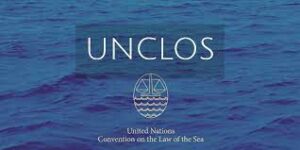Fatih Yurtsever*
The United Nations Convention on the Law of the Sea (UNCLOS), considered a “Constitution for Oceans,” is an international treaty that provides a legal framework for many maritime activities. UNCLOS was adopted following the third United Nations Conference on the Law of the Sea (1973-1982) and entered into force in 1994, one year after Guyana became the 60th state to ratify the treaty. The importance of UNCLOS stems from the fact that it systematizes and codifies the norms and principles of the international law of the sea, based on centuries of experience in the field of maritime law, much of which is reflected in the United Nations Charter and existing international maritime law norms, such as the 1958 Geneva Conventions. The convention has been ratified by 168 parties, including 164 member states of the UN, one observer state (Palestine) and the European Union. Turkey actively participated in all conferences but is not a party to UNCLOS. Is it not a contradiction that Turkey is not a party to UNCLOS while demanding that the maritime jurisdiction areas in the eastern Mediterranean be resolved according to the rules of international law?

Turkey avoided signing and ratifying UNCLOS, as the convention did not allow reservations. Turkey claims that the application of the UNCLOS provision regarding the breadth of territorial waters in semi-enclosed seas like the Aegean Sea and the eastern Mediterranean would be contrary to the principle enshrined in Article 300 that prohibits the abuse of rights. Applying the 12 mile territorial sea rule would convert the Aegean into a Greek lake because of its many Greek islands. Turkey also contends that the principle of equity must be applied in the delimitation of territorial waters between opposite coasts, in which islands on the opposite side of the median line have a distortive impact on the delimitation of maritime zones.
During the travaux préparatoires of UNCLOS, Turkey explicitly stated its concerns and offered about shortcomings of the current provisions. For instance, Turkey proposed in a draft article on the Regime of Islands that “An island situated in the economic zone or on the continental shelf of other States shall have no economic zone or continental shelf of its own if it does not contain at least one-tenth of the land area and population of the State to which it belongs.” However, this proposal was not accepted by most other nations, which do not have problems with their neighbors related to the delimitation of maritime boundaries. The arbitrational courts approved this proposal in the Ango-France and St. Pierre and Miquelon cases. It demonstrates that even the provisions of well-known international treaties can produce unjust results.
Due to the unique geographic characteristics of both the Aegean and the Mediterranean seas, Article 121 of UNCLOS prevents Turkey from benefiting from natural resources in proportion to the length of its coast. Usually, UNCLOS does not stipulate the direct application of its provisions. Instead, it establishes a four-step dispute settlement mechanism to encourage parties to reach equitable solutions.
Section One of UNCLOS Part XV includes non-compulsory procedures to find solutions via conciliation and negotiation. If the parties cannot reach an agreement, Section Two requires parties to use compulsory dispute procedures, including the International Court of Justice (ICJ) and the International Tribunal for the Law of Sea (ITLOS).
It can be argued that there is no reasonable ground for Turkey not to sign UNCLOS due to the presence of other dispute settlement methods. The unclear and unfair provision of UNCLOS regarding the Regime of Islands increases the unpredictability of international courts’ decisions. However, there are decisions of international courts that support Turkey’s arguments.
Customary international law status of UNCLOS
There is consensus that UNCLOS provisions have acquired the status of customary international law. This means that states must abide by these provisions whether or not they are parties to UNCLOS. For this reason, non-party states, including Turkey and the United States, have drafted many laws on the law of the sea in accordance with the provisions of UNCLOS. For example, Turkey has established 12 nautical miles (nm) of territorial waters in the Black Sea and the eastern Mediterranean. Apart from jus cogens status, there is no clear hierarchy between treaties and customary international law, both of which are fundamental sources of international law, according to Article 38 of the Statute of the International Court of Justice.
After World War II, the number of new customary rules of international law increased rapidly, and states seeking to escape the adverse effects of some rules preferred to invoke the “persistent objector doctrine.” Turkey has legitimate reasons to invoke this doctrine to protect its national interests in its adjacent waters. However, it is difficult for Turkey to maintain this position as it has a negative impact on Turkey’s integration into the international community.
The maritime disputes in both the Aegean Sea and the Mediterranean Sea can be classified as the most challenging maritime zone delimitation disputes in the world due to the complexity of the geography. Moreover, the maximalist legal discourse of Greece makes it difficult to reach equitable and fair solutions via negotiations or reconciliation. In Turkey, the ill-prepared and nationalistic “Mavi Vatan” (Blue Homeland) doctrine, which contains significant flaws in international law, has been a considerable obstacle to creating an effective negotiating mechanism between the countries of the region. International law should be the only way to solve maritime delimitation disputes in the Aegean and eastern Mediterranean. Therefore, Turkey should abandon the Mavi Vatan doctrine and develop a holistic approach regarding maritime delimitation in the eastern Mediterranean based on regional cooperation and the international rule of law.
* Fatih Yurtsever is a former naval officer in the Turkish Armed Forces. He is using a pseudonym out of security concerns.

